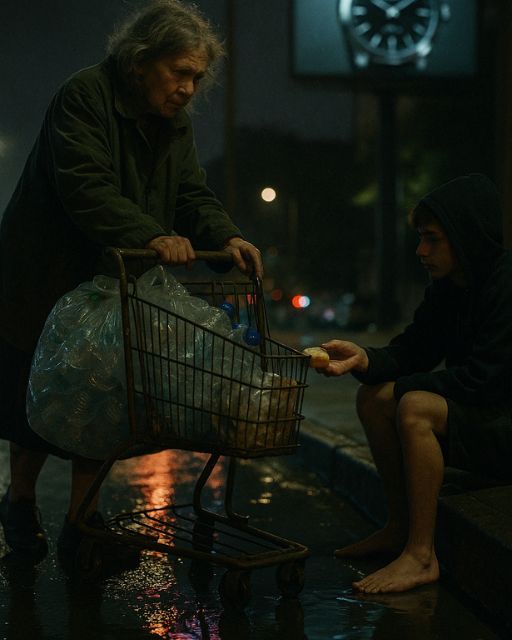It was just after 10 p.m., and the rain hadn’t let up for hours. I was sitting on the curb barefoot, hoodie soaked, trying to act like the water pooling around my legs didn’t bother me. Truth is, I hadn’t eaten since yesterday morning. I was starting to forget what warm even felt like.
That’s when I saw her.
She came slowly around the corner, pushing this rusted-out shopping cart full of plastic bottles and what looked like stale bread in a grocery bag. No umbrella. Just a thin coat and shoes that squished with every step. She must’ve been in her seventies, maybe older.
She stopped when she got close and just looked at me. Didn’t say anything. No judgment, no pity. Just this quiet look like she knew exactly what kind of night I was having.
Then she reached into the bag in her cart, pulled out a small piece of bread, and held it toward me.
I hesitated. I didn’t want to take the last thing she had. But she nodded like she already knew what I was thinking.
I took it. Said, “Thank you,” so quietly I wasn’t sure she heard me.
She did.
Because that’s when she said,
“When you got nothing left, kindness is the only thing you can still afford.”
Then she leaned in a little closer and said something else. Something that made me sit up straight, because it wasn’t just a kind phrase—it was personal. Too personal.
“Your mama used to say that same thing.”
I froze. I hadn’t heard anyone mention my mom in years. Not since she passed.
The woman saw the shock in my face and just smiled gently, like she was expecting it.
“I knew her,” she continued. “Back when we both cleaned offices downtown. She used to bring me coffee from home every morning. Told me one day her boy would grow up to help people.”
I didn’t even know what to say. My mom used to mention a friend named Alma from her cleaning job, but I never met her. Never thought I would.
“You’re Alma?” I asked, barely getting the words out.
She nodded. “Haven’t heard that name in a while.”
I stared at her. Wet, tired, cold—and now completely overwhelmed. How do you even begin to thank someone who not only gives you their last piece of bread, but also carries a memory of your mother you didn’t even know was still out there?
We sat there for a few minutes, quiet except for the sound of the rain hitting the pavement. Then she said something I’ll never forget.
“Your mama always said storms pass. Just don’t let them drown you while you’re waiting.”
That night, I helped Alma push her cart to the shelter a few blocks away. It wasn’t much, but they had dry blankets and warm soup. She insisted I take the top bunk and joked that her bones couldn’t handle climbing anymore.
Over the next few weeks, we stayed in touch. I started picking up small jobs—dishwashing, sweeping up behind a diner, things most people overlooked. And Alma? She taught me little things that made a big difference: how to keep your socks dry using plastic bags, how to stretch a dollar store can of soup into three meals, and most importantly, how to treat people with dignity, no matter what they look like or what they’ve lost.
Then came the twist.
One morning, I showed up to the shelter and Alma wasn’t there. They said she’d been taken to the hospital. Her lungs had been acting up for a while. I found her the next day, hooked up to machines, eyes still bright as ever.
“They say I might not have much time,” she whispered. “But that’s okay. I got to see your mom’s boy stand on his own two feet. That’s enough.”
I sat there with her all afternoon. Before I left, she reached into the drawer next to her bed and handed me a little pouch.
Inside was a folded envelope with my name on it.
When I opened it later that night, it was a letter—written in my mom’s handwriting.
“If Alma ever finds you,” it read, “believe her. Trust her. And when you’re ready, use this to get off the street and pay it forward.”
Tucked inside the envelope was a prepaid debit card and a crumpled business card for a community outreach center. My mom must’ve written that note years ago—how Alma kept it safe all this time, I’ll never understand.
But it changed everything.
With the help of that card and the community center, I got into a transitional housing program. I found steady work with a city maintenance crew. Six months later, I moved into my own studio apartment—small, but mine.
Alma passed peacefully two weeks after I visited her in the hospital. The shelter held a small memorial. Just a few candles, some old pictures, and a lot of tears.
I still keep that letter from my mom in my wallet. And whenever it rains, I think about Alma—her shoes squishing through puddles, her soft smile, and her voice telling me not to let the storm drown me.
Now, every Sunday, I volunteer at the same shelter where I met her. I bring fresh bread.
Because sometimes, when someone gives you their last piece of bread, they’re giving you more than food.
They’re giving you hope.
If this story moved you, share it. Someone out there might need to hear it today.
And if you’ve ever been helped by someone when you were at your lowest, tell that story. Remind the world that kindness doesn’t cost much—but it’s worth everything.




